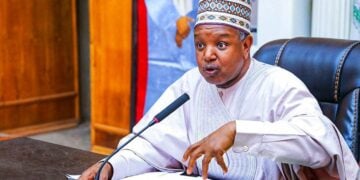The federal government’s recent decision to remove Mathematics as a compulsory requirement for students in the arts and humanities seeking admission into Nigerian universities, polytechnics, and colleges of education has sparked mixed reactions across the country.
In a statement from the Ministry of Education, the new framework aims to widen access to higher education while maintaining academic standards across all tertiary institutions. While many students and parents may welcome this new policy as a relief from a long-dreaded subject, the decision raises more profound questions about the direction and purpose of our education system.
This newspaper believes that this policy, though perhaps well-intentioned, risks weakening the intellectual foundations of an entire generation. Although the Minister of Education. Mr Tunji Alausa, while commenting on the new policy, said the “… reform reflects our commitment to expanding opportunities for all categories of students while maintaining the integrity and standards of the education system”; however, many Nigerians see it as worrisome.
Mathematics is not merely a subject of numbers and formulas; it is the discipline of reasoning, the training ground for clear thought, and the foundation for evidence-based decision-making. To exempt any category of students from such discipline is to narrow their mental horizon and reduce their capacity for rigorous thinking.
The idea that mathematics is relevant only to the sciences is one of the most damaging misconceptions in the nation’s educational culture. Every discipline, including the arts and humanities, depends on mathematical thinking. The artist who balances proportion, the poet who constructs rhythm, the lawyer who builds logical arguments, and the historian who discerns patterns in time — all employ the logic and structure that mathematics cultivates.
In truth, mathematics is not about x and y; it is about clarity and coherence. It teaches how to separate assumptions from facts, test ideas before accepting them, and move from intuition to proof. These are skills essential to every field of human inquiry — including literature, law, philosophy, history, and the creative arts.
The problem in Nigeria has never been the presence of mathematics in the curriculum but the poor manner in which it is taught. For decades, mathematics has been presented as a cold exercise in computation, divorced from meaning and context. Teachers often focus on rote learning and speed, while examinations reward memorisation over understanding. As a result, students have come to fear the subject rather than see it as a way of thinking.
The government’s recent policy, therefore, mistakes the symptom for the disease. The challenge is not that arts students cannot cope with mathematics, but that our schools have failed to teach it as reasoning rather than ritual. Removing the subject entirely from their path does not solve the problem — it only deepens the national crisis of shallow reasoning and intellectual dependency.
In a world increasingly driven by data, logic, and analytical reasoning, the arts and humanities need mathematics more than ever. The modern writer must understand trends and evidence. The political scientist must interpret data and probabilities. The communication expert must measure audience engagement. Even the philosopher, in the tradition of logic and ethics, must reason from premises to conclusions. None of these can be done well without a foundation in mathematical thought.
Beyond its intellectual value, mathematics also shapes moral character. It rewards honesty with facts, patience with process, and humility before evidence. These habits of mind are critical in a society struggling with impulsive decision-making, corruption, and weak governance. A nation that cannot think logically cannot govern wisely.
We, therefore, urge the federal government and education policymakers to revisit this decision. Instead of removing mathematics, the emphasis should be on reforming how it is taught — especially to students in the arts and humanities. Mathematics should be integrated with real-life and disciplinary applications so that students can appreciate its relevance. Let literature students learn the logic of structure; let history students use mathematics to analyse patterns of change; let law students apply reasoning to evidence. When mathematics is taught as a language of thought, not as punishment, it becomes empowering rather than intimidating.
We must also rethink teacher training. Teachers of mathematics should be trained not only in content but in communication — to connect concepts to creativity, logic to life. Parents, too, have a role to play by encouraging curiosity rather than fear. Instead of asking, “What score did you get in maths?”, they should ask, “How did you think about that problem?” Our goal as a nation should not be to produce walking calculators, but thoughtful citizens capable of solving problems with reason and imagination.
The removal of mathematics from the arts curriculum sends the wrong signal at a time when Nigeria needs more critical thinkers, not fewer. It suggests that thinking can be optional, that analysis can be separated from creativity, and that reasoning can be sacrificed for convenience. No nation has ever developed by making logic optional.
As we strive to reform our education system to meet the demands of the 21st century, we must recognise that mathematics is not an obstacle to learning — it is the foundation of understanding. Whether in the sciences or the humanities, it remains the universal language of reasoning. The challenge before us is not to eliminate it, but to teach it in ways that inspire.
The future of education lies not in lowering standards but in lifting minds. To think clearly is to learn deeply — and mathematics remains one of the finest teachers of thought.





